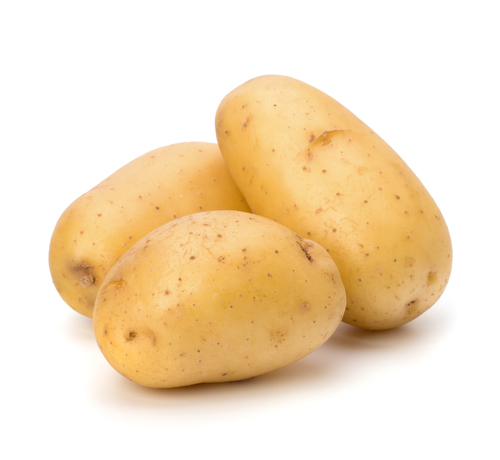Potatoes. A very powerful vegetable that doesn’t get the respect it deserves. The ubiquitous, unappreciated and delicious spud.
Beyond being delicious, potatoes are also cheap, relatively easy to grow and are loaded with a ton of important nutrients. Yes, the lowly spud actually offers some pretty impressive health benefits.
- Highly Nutritious
So let’s take a look at the nutritional content of potatoes. One medium baked potato with skin on contains:
- Calories: 161
- Fat: 0.2 grams
- Protein: 4.3 grams
- Carbs: 36.6 grams
- Fiber: 3.8 grams
- Vitamin C: 28% of the RDI
- Vitamin B6: 27% of the RDI
- Potassium: 26% of the RDI
- Manganese: 19% of the RDI
- Magnesium: 12% of the RDI
- Phosphorus: 12% of the RDI
- Niacin: 12% of the RDI
- Folate: 12% of the RDI
This basic nutritional content can vary based on the variety of potato and also how it is prepared. For instance, deep frying potatoes adds far more calories and fat (the bad kind) than baking or boiling potatoes. And obviously, adding a ton of butter and sour cream will also add fat and calories.
Also important to mention is that the majority of vitamins and minerals are in the skin, so peeling potatoes can significantly reduce the nutritional content.
- Provide Antioxidants
Did you know potatoes contain some of the most powerful antioxidants like flavonoids, carotenoids and phenolic acids? As you know, at any given time, your body is being attacked by free radicals. These help to create disease. But antioxidants help to neutralize free radicals before they can do any damage.
One study found that the antioxidants in potatoes may suppress the growth of liver and colon cancer cells. Other studies suggest colored potatoes like the purple variety may contains as much as four times the antioxidants than white potatoes.
- May Improve Digestion
Potatoes contain something called resistant starch that has been shown to improve digestive health. It is called resistant starch because it resists digestion and passes right into the intestines.
When resistant starch reaches your large intestine, it feeds all of the beneficial bacteria in your gut. These bacteria digest it and turn the starch into short-chain fatty acids, particularly butyrate, which has been shown to reduce inflammation in the colon, strengthen the colon’s defenses and reduce the risk of colorectal cancer. Butyrate is also believed to aid people that suffer from inflammatory bowel disorders such as Crohn’s disease, ulcerative colitis and diverticulitis.
- They’re Naturally Gluten-Free
Did you know that one of the most popular diets around the world is the gluten-free diet? Gluten is a family of proteins that are found in grains like rye, spelt, wheat and barley that cause some people digestive upset.
While most people do fine with gluten, those with celiac disease or a gluten sensitivity can experience abdominal pain, diarrhea, constipation, bloating and skin rashes when they ingest gluten.
If you are on a gluten-free diet, you’ll be happy to know that potatoes are naturally gluten-free, and so won’t trigger painful symptoms. Having said that, not all recipes that include potatoes will be gluten-free, so be sure to always read ingredients or ask the server.
- May Help with Weight Loss
Potatoes contain a lot of fiber and are incredibly filling. In one study, people were asked to eat 38 common foods and then rate them based on how filling they were. Potatoes received the highest fullness rating of them all.
Any food that can help you feel fuller longer may help you in losing weight, since it will curb hunger pains and stop you from snacking. This does not give you license to eat an entire plate of French fries with gravy. Use your head. Or your spud.
- May Improve Blood Sugar Control
Remember that resistant starch I talked about a while ago? Well, your body does not fully digest it and so it does not get absorbed into the bloodstream. Instead, it passes into the small intestine and makes its way all the way to the large intestine. Since it does not get fully digested and absorbed, the carbohydrates do not have as much of an effect on blood sugar.
But on top of this, apart from feeding beneficial bacteria in the gut, resistant starch has been linked to reducing insulin resistance, which in turn improves blood sugar control.
In an animal study, mice that were fed resistant starch showed reduced insulin resistance. As a result, their bodies were more efficient at removing excess sugar from their bloodstream.
Human studies also show promising results. In one study, people with type 2 diabetes found that when consuming a meal with resistant starch, they were able to maintain healthy blood sugar levels.
Want to know an easy hack to increase the amount of resistant starch in potatoes? Boil potatoes, then store in the refrigerator overnight and consume cold.
While they don’t get all the love and glory that some vegetables do (admit it, you’ve taken potatoes a little bit for granted), potatoes offer a lot of fantastic health benefits. Today let us all appreciate how LUCKY we are to have the spud in our life, our kitchens and our stomachs!
You’ve GOT to See This Video!
If you like the idea that eating certain foods can help you control your diabetes, then you’ve got to stop what you’re doing and watch this video. You’ll learn that type 2 diabetes is a lifestyle disease, and that means making some simple changes in your lifestyle can help you COMPLETELY REVERSE IT!
 Validating...
Validating... 





Leave a Reply